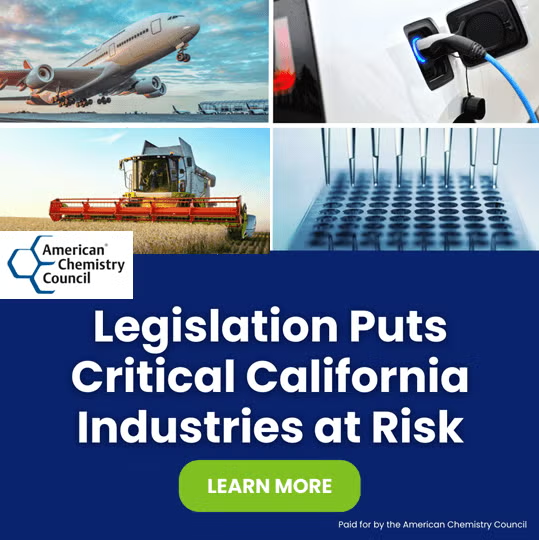
A broad coalition has joined together to urge California lawmakers and voters to oppose proposed legislation that could jeopardize the state’s economy, business community, and job environment. The coalition formed in opposition to California Senate Bill 682, which would prohibit the sale or distribution of numerous commercial and industrial products containing or manufactured with a group of chemistries called perfluoroalkyl and polyfluoroalkyl substances (PFAS).
PFAS are a diverse universe of chemistries integral to products Californians rely on every day, including in industries that are critical to the state’s economy, like semiconductors, electronics, and defense.
PFAS also play a critical role in healthcare, agriculture, building and construction, and renewable energy, and are a critical technology for the state’s economy.
For example, one PFAS group, known as fluoropolymers, is widely used to provide consumer and industrial products with enhanced strength, durability, stability, and resilience, helping them to operate far more effectively and for a longer time. Fluoropolymers are very different from other PFAS, and they don’t dissolve into water or disperse into the air, and they can’t be absorbed into our bodies. Peer-reviewed research has shown fluoropolymers meet international scientific criteria for “Polymers of Low Concern.”
But SB 682 would stifle the innovations that PFAS chemistries provide by lumping them into one monolithic group and creating onerous new bureaucratic restrictions and requirements. These could dramatically increase industry costs, which could make their way down to California residents in the form of:
- higher prices,
- unavailable products,
- business closures,
- and job losses.
These costs could be especially burdensome for small and medium-sized businesses that may lack the resources to adapt quickly to new regulations and requirements.
There has been widespread discussion about PFAS in the media and online, much of it incorrect, misleading, or over-sensationalized. The fact is that the family of PFAS chemistries are vital to our lives in the 21st century, enabling new innovations and improvements in areas like the smart phones, tablets and telecommunications systems; semiconductors that run the modern, high-tech economy; the aircraft that power the U.S. military; solar panels, turbines and batteries critical to alternative energy development; and medical devices and life-saving drugs.
An economic analysis of a similar California bill, SB 903, which failed in 2024, estimated annual compliance costs for the state ranging from $3.3 million to $15 million, which would represent up to $62 million in new costs between 2026-2032 for the state budget. Following 2032, ongoing costs are estimated at $7.9 million per year, further posing a threat to the state’s economy.
SB 682 could also place California’s industry at a severe competitive disadvantage compared to other states or countries with more realistic and scientifically based PFAS regulations. These critical businesses could face higher production costs, making their products less competitive in national and global markets, and could result in their relocation to regions with more favorable regulatory environments. This, in turn, could lead to a decline in tax revenues, jobs, and economic growth for California.
California lawmakers should look to the challenges faced by other states that have passed similarly broad PFAS bans. Maine’s Department of Environmental Protection has struggled to implement a similar mandate, resulting in more than 2,400 extensions granted to companies and prompting legislative reform of the initial law. Minnesota also enacted a comprehensive ban on PFAS and has already run into complications, with state lawmakers having to delay enforcement provisions due to widespread protests by local businesses and residents.
California residents and policymakers should know that PFAS chemistries in commerce today have undergone rigorous review by regulators before their introduction. PFAS chemistries are regulated at both state and federal levels, and significant efforts have also been made to address potential concerns with PFAS through U.S. Congressional action.

This coalition supports strong, science-based regulations for PFAS chemistries that consider the differences between them and continue to allow for the many products that they enable. California lawmakers should vote no on SB 682 and avoid compromising the economic stability and competitiveness of their economy.



